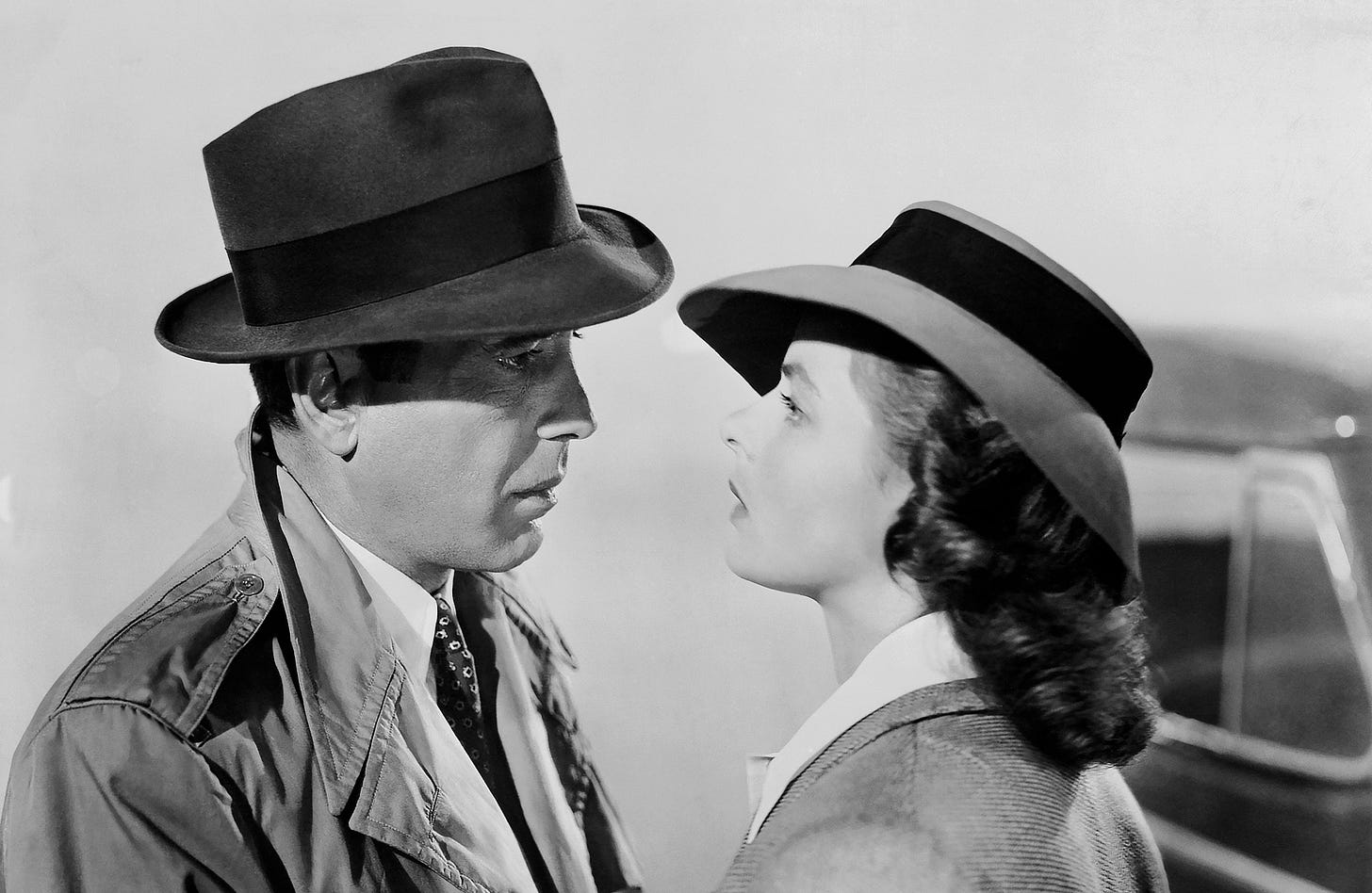Romance and reluctant idealism
#15 - 'Casablanca'
Settling in to write about my favorite film of all-time - yes, I have an unequivocal favorite - I am struck mostly by the feeling that Casablanca does not really seem like it should exist.
It is such a great and greatly multi-faceted film - a bittersweet romance, a political statement, a deeply American film, a story about refugees, a dark comedy. It is paradoxically timely and timeless. Its release came just weeks after Allied forces entered the very real Vichy-occupied territory depicted fictionally in the film. Its impact is as broadly reaching as any other piece of pop culture from the 20th century. It is perhaps the greatest example of the greatness of the mid-century studio system, sporting five different writing credits and produced in a year when star Humphrey Bogart was in three other releases. In an age of deep cynicism about the nominal successors to that system, it feels weird to even write that.
But here we are.
Casablanca is a real thing. And I have to try and write about it.
Casablanca is an artifact to treasure, to cling to tightly as its story unfolds, to marvel at and mourn when it concludes, and, finally, to quote incessantly until it is time to watch again.
Its almost contradictory traits and attributes are what make it such a wonder. It is that ultimate example of the studio system, and yet it is coursing with unmistakable authenticity. As Noah Isenberg highlights in his book, We’ll Always Have Casablanca, much of that stems from a supporting cast that was composed of European refugees of Nazi Germany, including Paul Henreid (Victor Laszlo), Conrad Veidt (Major Strasser) and Peter Lorre (Ugarte).
It covers an almost breathtakingly tiny amount of physical territory, even for a film shot on a studio lot. Indeed, that is the point of Casablanca as a setting - a place where people become trapped. There is Rick’s Cafe and The Blue Parrot and Captain Renault’s office and the airport tarmac … and not much else.
And yet, the breadth of the characters in the Cafe and the depth of what is tacit or hinted at or said outright but left unexplained leaves you with something new to find and appreciate every time. My new favorite after this past viewing: Rick deadpanning “I was misinformed” when explaining to Captain Renault that he came to Casablanca “for the waters.”
It is a film that manages to feature “La Marseillaise” prominently and yet feel uniquely American. This is no small feat.
Awe and wonder and “cinematic achievement” are not what make a film beloved. It is why I greatly appreciated 2001: A Space Odyssey - why I will reference it in deep, philosophical thoughts and conversations - but am likely to view it only a handful of times in my life.
Casablanca is the supreme beloved. It is returned to, year after year by myself and so many others, because of its spirit.
The first time I watched the film, I was in college. I can’t remember if it was before or after I met a girl who would break my heart, but I was in the mood to get my heart broken either way. Humphrey Bogart’s hopeless, broken, drunken rant - “of all the gin joints in all the world …” - was deeply meaningful then. So was, for some reason, Dooley Wilson’s immediate precursor.
“We’ll take the car. We’ll drive all night. We’ll get drunk. We’ll go fishing and stay away until she’s gone,” says Sam, pleading with Rick.
Casablanca is hardly a film about male bonding, the last line of the film notwithstanding. And yet here was a single bit of dialogue, delivered in the right setting - from one friend to another deep in to a shadow-filled late-night bender - that made it clear that the film understood male relationships all the same.
My most recent viewing - just a few months ago - was my first in a real theater and my first start-to-finish with my wife. It was our anniversary, so you might think it was the romance we were after. That didn't hurt. But I found myself, in part because I had just finished Isenberg’s book and in part because of current affairs, thinking more about the politics and the morality of the tale than love, particularly given the context in which the film was originally made.
It traffics in the suddenly timely issue of migrants and refugees. Any of us seriously considering travel bans and the like would do well to see this film again through that lens.
Beyond that, its protagonist, I think, offers a humble vision of what America ought to be.
Rick Blaine is a reluctant idealist. Confronted directly by a moral choice, he seems incapable of making the wrong one despite the fact that it is the easier path and that doing so shatters his neutral, cynical, removed persona. This, I like to think, captures America itself at its very best. Deep down, and despite all the bluster to the contrary, we’re romantics, to paraphrase Captain Renault. The trouble these days is that you seem to have to dig so deep to find that spirit.
Anyway, this is the true power of Casablanca - the reason it is one of a kind and stands, still, atop the mountain of all beloved films.
It will turn 75 years old in a few months, and it is still able to reach across the decades - both since it was made and since you first viewed it - to be deeply affecting, newly and differently each time it is taken in.




